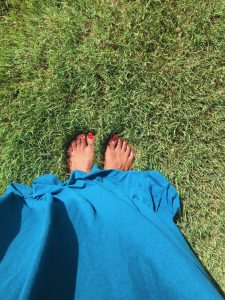I mentioned my plans to transition out of K-12 and into reading/writing/teaching about women’s issues. I highlighted rape culture and sexual violence and fibroids by name, although my net is cast a bit wider than these. The woman who inquired about my goals made the raised eyebrow/pulled down lips/impressed face and nodded. “Wow. Good for you. What got you moving in that direction?”
Who knows?
It brings to mind a similar question asked of Angela Davis. In a lecture recorded as The Prison Industrial Complex, she discussed her activist beginnings: “What made you decide to become an activist? What was that pivotal event in your life? And for years and years I thought about it.” She went on to mention the 16th Street Baptist Church bombing that killed four little girls in Birmingham, Alabama, and how she initially believed that to be the catalyst. Upon further reflection, she realized that wasn’t it:
Finally, after struggling with this for years, I decided that there really was no particular moment when I decided to become an activist. As a matter of fact, I grew up with the idea that in order to live in segregated circumstances… my parents basically taught us that we had to be critical of the way things were. Otherwise, we could not affirm our own humanity. And that we had to dedicate our lives to the kind of transformation that would make this a better world to live in for all of us. And so I’ve learned that wherever I am, whatever I happen to be doing at the moment, I have to fulfill that commitment that has informed my life.
Now, I don’t have years invested in feminist activism and advocacy, so it’s not like I have a long history to consider. Despite my brief affiliation, I’m hard pressed to supply a satisfying answer. In fact, today was my first encounter with the question; I’ve simply never thought about why. So I sputtered. In fact, I’m writing now, more as a think-aloud, than to offer a definitive answer.
I think it’s a series of dots that are just now being connected. For instance, I’ve practiced Nichiren Buddhism for 13 years now. Studying and practicing a life philosophy grounded in human potential and equality leans one ever toward more progressive and compassionate ways of knowing and being. Encountering Paulo Freire and critical pedagogy in graduate school 5 years ago is another dot. A huge one really. Unlike the constant flow of the water of Buddhism, reading Freire and studying critical inquiry pedagogy caused a fiery, seismic shift.
Then there was the class that wasn’t. The University of Georgia offered a course on Black women’s narratives. I attended the first day, but enrollment was low, and the class didn’t make. The professor showed Chimamanda Adichie’s TED Talk on the Danger of the Single Story – which became seed as much as dot – and I eventually ordered all the books on her syllabus. I started my own class really, and began reading (and writing) when I could. Dot.
A series of shares in the Red Clay Writing Project’s Summer Institute led me to brainstorm a study on teenage rape narratives, and I wrote and studied my own as a pilot. Dot. An article here or there would move me to anger, tears, or elation. Dot. And suddenly, here we are. At the beginning, still. And like any other journey, each day is an opportunity for another step.
Onward.


 Speaking of other projects – I’m the program committee chair of the
Speaking of other projects – I’m the program committee chair of the